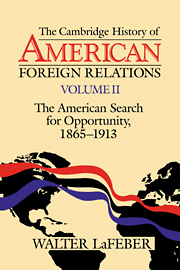Book contents
- Frontmatter
- 1 Springboards and strategies
- 2 The second Industrial Revolution at home and abroad
- 3 Race for empire
- 4 “America Will Take This Continent in Hand Alone”
- 5 Crossing the oceans
- 6 1893–1896: chaos and crises
- 7 The empire of 1898 – and upheaval
- 8 Pacific empire – and upheaval
- 9 Theodore Roosevelt: conservative as revolutionary
- 10 William Howard Taft and the age of revolution
- Conclusion: The 1865–1913 Era Restated
- Bibliographic Essay
- Index
- THE CAMBRIDGE HISTORY OF AMERICAN FOREIGN RELATIONS
- References
7 - The empire of 1898 – and upheaval
Published online by Cambridge University Press: 28 March 2008
- Frontmatter
- 1 Springboards and strategies
- 2 The second Industrial Revolution at home and abroad
- 3 Race for empire
- 4 “America Will Take This Continent in Hand Alone”
- 5 Crossing the oceans
- 6 1893–1896: chaos and crises
- 7 The empire of 1898 – and upheaval
- 8 Pacific empire – and upheaval
- 9 Theodore Roosevelt: conservative as revolutionary
- 10 William Howard Taft and the age of revolution
- Conclusion: The 1865–1913 Era Restated
- Bibliographic Essay
- Index
- THE CAMBRIDGE HISTORY OF AMERICAN FOREIGN RELATIONS
- References
Summary
Simply by manipulating tariff schedules, the United States triggered two revolutions in the 1890s and accelerated a third (in the Philippines). The first, forced by the 1890 tariff, occurred in Hawaii during 1893 and led to American annexation in 1898. The second, caused by the sugar provisions of the 1894 Wilson-Gorman Tariff, created chaos in Cuba. Between 1894 and 1896, Cuba’s exports to its best customer, the United States, fell 50 percent. The results were revolt, then war, then a new United States empire in the Caribbean and the Pacific and – as an integral part of these developments – a new U.S. executive that evolved precisely to try to create a modicum of efficiency and stability out of a foreign policy that gave priority to commercial opportunity, domestic politics, and strategic power and only then to a concern for order.
Cuba: The Grave Danger of “Revolution Within Revolution”
Since the outbreak of the 1868–78 revolt and the growing integration of U.S. capital with the island’s rich sugar plantations, which found a huge U.S. market, Cuba’s society and economy had been transformed – and made highly vulnerable. The rich Creole planters and the growing number of North American investors in sugar mills and mines found their interests at one with the U.S. market. In 1892 alone, U.S. investors put in $1.2 million. When the 1894 tariff act threatened to paralyze both the sugar and cigar-making industries, unemployment spread and revolution reerupted. The rebellion was led by José Martí, who became the most beloved and important figure in Cuban history. Born in 1853 as the son of a Spanish military officer stationed in Cuba, he was arrested as a danger to the state at the age of seventeen during the first revolt.
- Type
- Chapter
- Information
- The Cambridge History of American Foreign Relations , pp. 129 - 155Publisher: Cambridge University PressPrint publication year: 1993



